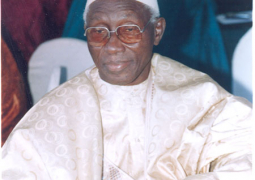Heinemann African Writers' Series
90 pages
Great African
Literature
This book was first published in 1979, and it won the first ever prestigious Noma Award for Publishing in Africa in October 1980. It won quick international acclaim, going into English translation a year later and since then it has been rendered into more than a dozen languages. Senegalese TV made a lengthy film from the book in the early 1980s.
It has become a classic of African literature because of its theme, its penmanship and the tragedy of its able authoress, Mariama Ba.
The story of widowhood, exploitation of women in such sad state, polygamy, teenage pregnancy and the general double standards by which men and women are treated in Africa, makes it one of the earliest works of feminist literature by an African writer. It is the cri de coeur of a woman, Ramatoulaye, who loved and married. For much of her marriage life, she was contented: had children, a profession, a loving husband and so on. Suddenly, when her husband, Modou, marries a second wife, Ramatoulaye finds herself betrayed, and confused. She was :"retired" in favour of the younger wife, who happens to be a friend of her daughter. The pain is indeed palpable. When Modou died, she suffered a double blow, and to empty her anguish she decided to write to a friend Issatou, who had divorced and relocated to America, unable to stand the heat of polygamy.
That letter is this book. This is a powerful treatise on women's rights and liberties.
The letter form of the novel also makes it a unique piece of African literature. The narrator addresses the entire world through her friend Issatou; the book is a giant success in metonym. The authoress' liberal use of local words and terms makes the work highly informal, yet basic and down to earth.
The tragic end of Madame Ba also explains partly the success of the book. Born in 1929 in Dakar, Senegal, she rose to become a teacher and head of school before going into writing. At the Noma Awards at Frankfurt Book fair in 1980, she was the cynosure thanks to the Award. She immediately became a spokesperson for African literature. She was in "full flight"; sadly, soon after collecting the award she was diagnosed with a terminal illness. In 1981 she died and Africa lost a great woman of letters.
It takes a brave woman to write such a book in a highly Islamic and traditional society like Senegal; the audacity of the novel in exposing the unnecessary pain that women, sometimes educated, urban and sophisticated, have to endure in traditional society makes it almost heretical at the time. The book garnered strong reaction from some more conservative sectors of Senegalese society at the time. Yet, long after her demise, Mariama Ba remains the strong woman of African literature, and definitely the most-read Senegalese writer. Her works spawned a new tendency in Senegalese literature; the tendency of the combative woman writer who uses rounded female characters and voices to shout out against gender bias and double standards.
All critics are agreed that the book is autobiographical; the book looks a little unseemly at some points, which is normal for a first novel, but as it progresses, the characters, language, plot pick up steam and go classic.
This is a gem; it is in the school reading list and it deserves , a place there for it is a great work of feminist literature.
The book is available at Timbooktoo, tel 4494345.
Read Other Articles In Article (Archive)




